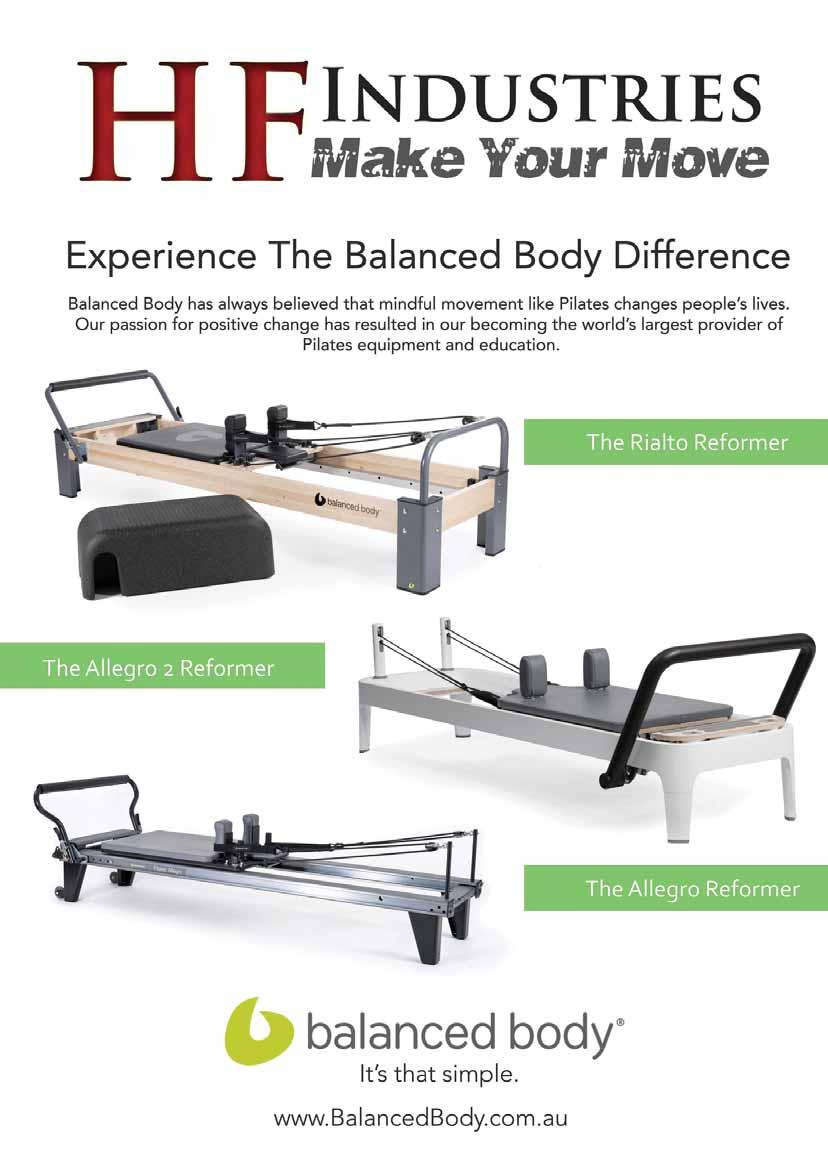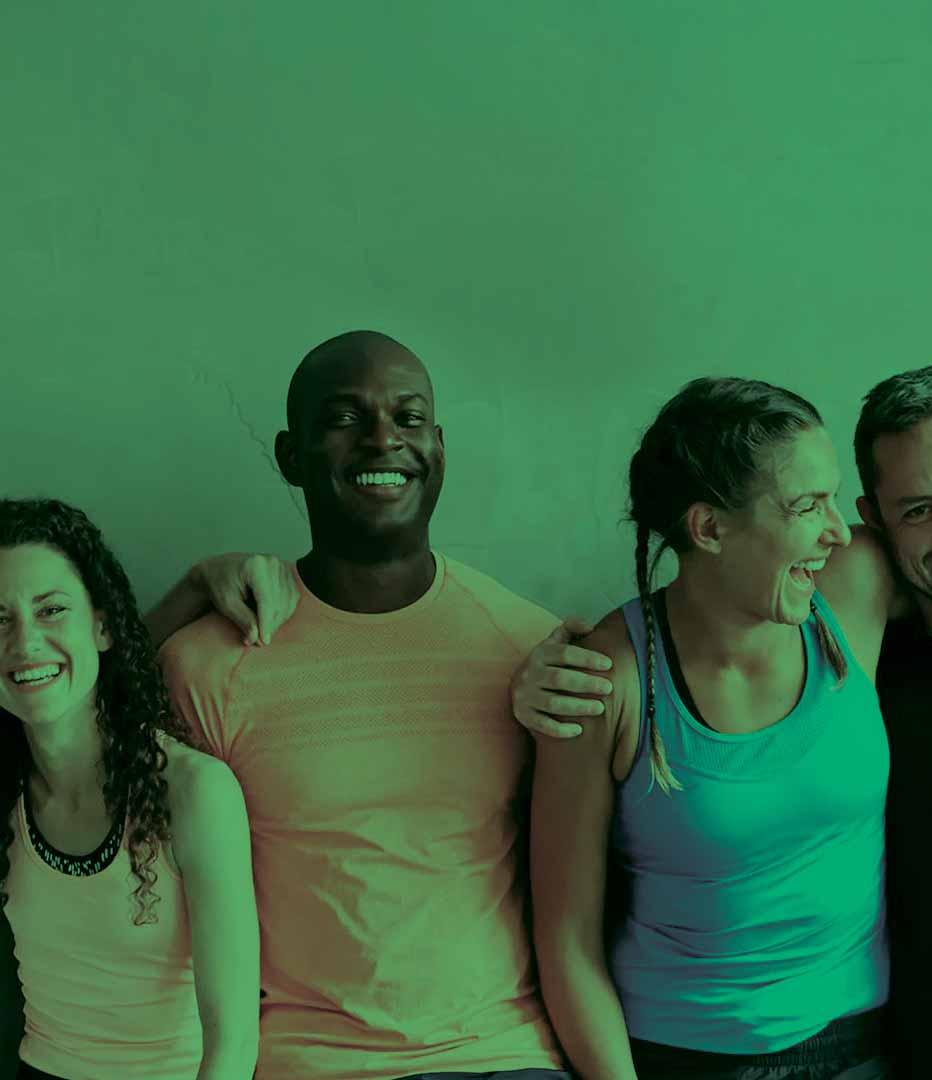
9 minute read
Fit to Franchise
Malvern KX Pilates studio (above, credit: Kit Haselden) and Aaron Smith (below, credit: Julian Kingma). Fit to franchise:
Beyond 10 years of KX Pilates
Advertisement
Aaron Smith explains why the journey is more important than the destination when growing a fi tness franchise
My career in fitness started working as a personal trainer, but it was not until I went overseas and saw how the personal touch one-on-one training offers could be scaled up to the business level that I was inspired to develop a dynamic Pilates studio brand in Australia. The idea was to keep it boutique to maintain the personal touch, but grow the community around it, so it always had a buzz. After an ordinary start, I can tell you there’s nothing sadder than an empty studio on opening day, I got my act together and people started hearing about us. Now, KX Pilates has more than 70 studios Australia-wide with an overseas master franchisor in Indonesia and country partner in China. Our core offering is a 50-minute session giving clients a full-body dynamic Pilates workout using customised equipment, including our purpose-built reformer machine.
However, the workout is only really half the reason why our clients are so loyal. The community aspect of our studios is important because it makes a fitness session something clients look forward to in their day or week. Just as sport brings people together, exercising together helps with motivation because it’s about sharing achievements.
Foundational elements The concept of achieving through steady incremental improvement is embedded in the foundation of the business, and it serves us well at a client level and a business level. KX stands for ‘Kaizen eXperience’ - where kaizen is the Japanese concept of continuous improvement.
It’s clear that the fitness aspect of what we offer is an example of continuous improvement, but KX reaches beyond that: we also consider ourselves a lifestyle brand. We want to see the kaizen attitude cross over to our clients’ daily lives. This, as much as the Pilates, was the reason I saw KX as a movement from the beginning.
Leveraging kaizen, in a business sense, has been hugely rewarding. If you start a business, my advice is to make sure one of its core values is about how to make things better! Our culture is not just focused on what the letters ‘K’ and ‘X’ stand


Malvern KX Pilates studio, and below and overleaf. Credit: Kit Haselden.
for - it’s not just a motto to us. The culture of kaizen translates to the way we conduct our business and network, from the individual studio right up to headquarters in the way we create space for improvement.
What this looks like at a network level is building that space into the fabric of our processes. It’s embedding a feedback cycle in our regular cluster (a group of five to 10 studios) meetings so franchise partners have the opportunity to vent, discuss issues, troubleshoot and propose ideas in addition to the chance to upskill and connect with one another. It’s providing forums online and in person for our franchise partners to contribute ideas that we evaluate and consider. We then dedicate time and resources to develop the most viable ideas into practise.
All this requires psychological safety, opportunity and followthrough, and you can only do it if the culture is ingrained in the network.
Ready to franchise Within a couple of years of opening my first studio I had three. My father took a look at my financial figures and felt that I could have a comfortable life if I stopped there. That’s not my way, however – I had a plan to make KX a brand that could change the way people thought about fitness.
Throughout my career, I’ve seen the best and the worst of the fitness industry. One of my pet hates is when gyms look at clients as sales and numbers rather than taking a personfirst approach. I once saw the late US entrepreneur Jim Rohn speak at a conference and the quote that struck me was, “care more about your customers than you do about the money you will make from them and you will be successful.”
In addition to improving customer service, my vision was to create a community around a KX studio that would enable clients to connect with like-minded people beyond their neighbourhood. The answer to that is franchising.
Franchising has both tangible and intangible elements. The tangible elements are things like the studio fit out, the customised equipment, the design and marketing aspects. The most important intangible element is the brand. The brand is a feeling and that feeling comes from the culture that you build into it. How you embed and maintain culture will determine the strength of your growth and the consistency and quality by which your business will be known.
It is fortunate that most of our franchise partners are drawn from our existing ‘family’ of trainers and clients, people who are well aware of our culture. Signing international master franchisors therefore presents a challenge. How do we recruit the right people, those who share our culture and values, who will in turn recruit the right people? Our first international master franchisor made it easy for us as she lived in Melbourne for six years, and had an immediate affinity to KX, and wanted to bring it to her home country, Indonesia.
China was a different story. We looked for someone who not only had the business experience but showed an active interest in fitness, with the understanding that KX is not just a financial proposition, it’s a lifestyle brand. Our business partner has 20 years’ experience in the fitness industry, including growing a yoga brand, so we’re definitely on the right track.
Our relationship is centred around trust. We are clear about the culture and business opportunities that KX Pilates offers while the team there has the in-country expertise. When our department leaders work with their international counterparts, we use guidelines and work alongside them to decide what would work best in their communities, which vary by province and even cities within a province. The master franchisor’s role is to find the intersection of brand culture and values with the country’s culture and values and leverage those to grow the business.
The future of fitness
Going to China has been eye-opening for another reason, and that’s the speed at which things move. Copycat studios can pop up just weeks after launch, so it’s essential that we take control by being exclusive and innovative to stay ahead of the pack.
Part of that is wrapped up in tangible aspects of our brand. We have customised equipment, and we are rolling out the Balanced Body KXformer, a proprietary Pilates reformer




Tasks and diaries Automated messages Lead allocation Real-time reporting.


CONNECT CONVERT GROW
MYMEMBERSALES IS THE MOBILE-FRIENDLY LEAD MANAGAEMENT SOLUTION THAT CAN HELP YOU GROW YOUR MEMBER BASE.




custom-built in the US to our specifications and exclusively for our brand. We have been working on the model for years, tailoring it to suit our unique workout.
In an over-saturated fitness market, having innovation as part of your business strategy will help you stand out. It’s no coincidence that our dedication to kaizen means we are, from the outset, innovation-focused because we are constantly looking for ways to improve. With the two pillars of innovation and culture as brand calling cards, we feel equipped for the future of fitness. If you’re a fitness business that wants to survive and thrive, make sure you have those elements worked out before you go forth. Aaron Smith is founder and Chief Cultural Officer of KX Pilates. Based on the Japanese philosophy of kaizen (continuous improvement), KX Pilates was founded by Smith in February 2020, is Australia’s largest Pilates franchise and the first Pilates brand to offer high intensity, dynamic workouts in the region. It currently has 74 studios across Australia, one studio in Jakarta, Indonesia and has plans to open a further 10 studios in 2021 including launching into China. In November 2018, he stepped down as Chief Executive with an initial focus on innovation and international expansion and in 2021 has stepped into the role of Chief Cultural Officer.
So you want to franchise your fitness business…
It’s important to establish up front what kind of franchisor you want to be. This will determine how you set up your franchise structure, as well as shape the recruiting, onboarding and franchise partner development process. The Ruler: The relationship is governed by the rules. It is based on the principle that if a franchise partner follows the process to the letter, they will succeed. This is fantastic for franchise partners who want the path laid out for them but not advised if you expect them to contribute ideas to improve the brand. At their worst, The Ruler can become The Dictator, where the franchisor micro-manages the franchise partner because they have no confidence in their capability. If you’re The Ruler, beware that this kind of toxic relationship can poison the network. The Partner: The relationship is governed by the collective. This franchisor sees that if they empower and collaborate with their franchise partners, they can achieve more together. Personally, I find this style of franchise relationship the most rewarding because franchise partners take ownership of the brand and support its values; when there’s mutual respect and open dialogue, you’re better able to advance the brand. It’s harder to expand quickly as The Partner because each franchise is treated as an individual, not a number, but the long-term outlook is much more stable. The Ambassador: The relationship is governed by the franchisor’s ability to represent the brand positively at industry level. These franchisors tend to be advocates, thought leaders and award-winners who cultivate a public presence. They provide a positive role model for franchise partners but don’t always create space for franchise partner contributions. The Ambassador attends events and participates in industry-level activities such as judging awards, to represent themselves and their franchise partners by association.
Of course, hybrids of these exist to balance the benefits and drawbacks of each franchisor style, so be aware of how they might affect your brand and find the right mix of traits for you.










